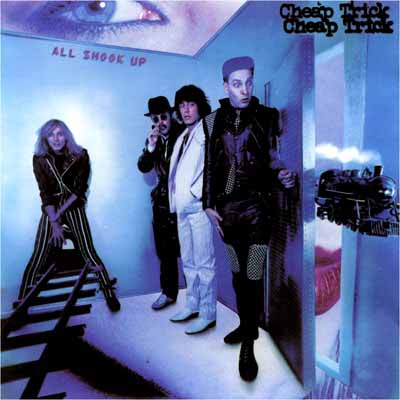
All Shook Up (1980)

1.Stop This Game
2.Just Got Back
3.Baby Loves To Rock
4.Can't Stop It But I'm Gonna Try
5.World's Greatest Lover
6.High Priest of Rhythmic Noise
7.Love Comes a-Tumblin'
8.I Love You Honey But I Hate Your Friends
9.Go For the Throat (Use Your Own
Imagination)
10.Who D'King
--Bonus Tracks--
11.Everything Works if You Let It
12.Can't Hold On
13.Day Tripper
14.Such a Good Girl
15.Take Me I'm Yours
When All Shook Up arrived in 1980, Cheap Trick seemed poised for a crowning moment. With Dream Police cementing their superstar status and former Beatles producer George Martin at the helm,
expectations were astronomical. Yet the album, rather than ascending, marks the beginning of a long descent—a curious, conflicted effort that seems as disoriented as it is ambitious.
The pairing of Martin and Cheap Trick ought to have yielded something magical, perhaps even transcendent. Instead, it produced an album that sounds simultaneously heavy-handed and undercooked.
One gets the impression that the band, stretched by years of constant recording and touring, was beginning to fray—not just musically but personally. Bassist Tom Petersson’s departure shortly
after the sessions was symptomatic of deeper fractures. He plays here, but the cohesion is lacking.
What’s most striking about All Shook Up is its sonic density. Guitars grind and pummel, drums thud with an almost mechanical weight, and arrangements veer into the overblown.
The rawness of their debut is echoed in tone but not in spirit. Where that first record crackled with malevolent wit and danger, this one feels murky, as if obscured by the very ambition meant to propel it.
There are flashes of intrigue: Baby Loves to Rock lurches with proto-metal force, while I Love You Honey But I Hate Your Friends toys with the kind of sardonic bite Rick Nielsen once mastered.
Yet both are hamstrung by production that seems to flatten their potential rather than elevate it. Love Comes a-Tumblin’ and Just Got Back hint at a new wave pivot—perhaps a gesture to stay
current—but they lack the rhythmic finesse or melodic clarity that defined the genre’s best.
Then there’s World’s Greatest Lover, a curious ballad that bears a clear Lennon/McCartney influence, and even benefits from Martin’s orchestral touch. But despite its intention,
the song overreaches—its sentimentality curdles into parody, and its length tests the listener’s patience. Even more baffling is Who D’King, a rhythm-heavy chant that, while perhaps
intended as playful pastiche, lands as indulgent and irritating.
The album failed to chart in the Top 40 and produced no hit singles, a sharp contrast to the multi-platinum peaks of just a year earlier. More than a commercial setback, All Shook Up
signals a band adrift, grappling with identity in a musical landscape shifting beneath their feet.
A brief note: the concurrent Found All the Parts EP added four tracks of mixed value, including a faux-live Day Tripper and the Budokan-era Can’t Hold On. Also included on later CD reissues
is Everything Works If You Let It, a throwaway from the Roadie soundtrack—ironically, one of the more coherent moments of this era.
In retrospect, All Shook Up stands as a transitional album—not quite a failure, but certainly not a triumph. It’s the sound of a great band caught between creative exhaustion and the weight of expectation,
looking for a new direction and finding only static.
Go back to the main page
Go To Next Review